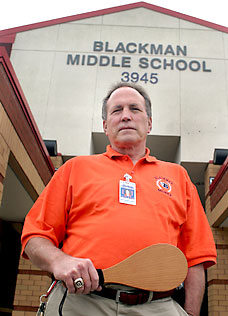Of the school districts surrounding Nashville, six allow paddling as a form of punishment.

Photo: MATTHEW H. STARLINGButch Vaughn, the principal at Blackman Middle School in Rutherford County, holds the paddle used at his school. The county's school system will examine its policy on paddling next month.
Metro schools have had a no-paddling policy since 2002, according to spokesman Woody McMillin.
Williamson County is the only other county school system in the area that says no to paddling.
Cheatham, Robertson, Rutherford, Sumner and Wilson counties all have school board policies that say corporal punishment is acceptable. Lebanon Special School District in Wilson also says it is acceptable.
Rutherford County's acceptance of paddling has landed the system in court, and Schools Superintendent Harry Gill said this is not the first time. The district will examine its policy next month.
Other districts that allow paddling don't use the punishment very much, system directors say.
''I really didn't realize the policy said it was OK,'' said Lynn Seifert, interim Cheatham County schools superintendent. ''We haven't done it in so long, I just thought the policy said, 'No.' ''
All of the districts that allow paddling have guidelines, and some allow parents to opt their children out of the punishment.
''Parents can sign a form at the beginning of the year if they don't want their kid paddled,'' said Andy Brummett, superintendent for Lebanon Special School District in Wilson County.
None of the district policies, however, requires school administrators to contact parents before a paddling. That bothers some parents, even those who don't mind their kids being paddled.
Deena Buckler of Murfreesboro, the mother of two teenage sons who attend Rutherford schools, said she had no idea her sons could be paddled without her permission.
''I am extremely shocked about that,'' she said. ''Now, with one of my sons, we tried the whole actions vs. consequences thing with him … but none of that worked, so we went with paddling and it was effective, but I knew about it the whole way.
''What I don't want is somebody deciding to paddle my kids and I'm never consulted about it.''
Seifert said Cheatham County school officials would call parents before paddling a child, if they ever have to punish a child in that manner.
James Duncan, Wilson County Schools superintendent, said paddling in his district must be a punishment of last resort.
''We don't have to paddle any child,'' he said. ''We have a healthy respect for parents who would rather their student not be paddled, and on the other hand we do not allow a parent to force us to paddle their child.''
''We do get that from time to time,'' he added with a laugh.
The Rutherford County lawsuit that prompted one board member to question the county's corporal punishment guidelines hasn't started a chain reaction in other Midstate counties.
''I haven't heard a thing,'' said Ronnie Meador, superintendent of Robertson County schools. ''I think everything is fine here, especially after the board voted to change the policy to allow only principals to paddle.''
Brummett, of the Lebanon Special School District, said he doesn't think a change is in the wind in Lebanon because there are a number of parents who support corporal punishment.
''There are still a good many number of parents who expect us to punish their child if they're acting up,'' he said. ''I think there's still that mind-set and it goes way back to that 'if it was good enough for my daddy' type thing.''
State law
The state law says any teacher or school principal may use corporal punishment in a reasonable manner against any pupil for good cause in order to maintain discipline and order within the public schools. The law also gives each local board of education the right to adopt rules and regulations as it deems necessary to implement and control any form of corporal punishment in the schools in its district.
Rutherford County school board policy
The Rutherford County school board does not require the permission of either a child's parent or guardian before corporal punishment is administered. The board's policy on corporal punishment says the punishment should be ''reasonable'' but does not specify any exact offenses for which paddling should be used. The policy also says consideration of the offender's age, sex, size, physical and emotional condition should be considered when determining the degree of punishment.
Memphis City schools board policy
Corporal punishment is permissible in the Memphis City Schools, but other means of punishment should be tried first. Corporal punishment may be administered by the principal, acting principal, assistant principal, or the teacher involved, provided permission is granted by and the punishment witnessed by one of the three previously mentioned administrative persons. The punishment should not be inhumane or degrading at any time.
Wilson County school board policy
The Wilson County school board does not require the permission of either a child's parent or guardian before corporal punishment is administered; however, parents can opt their children out of the punishment. The instrument used in the punishment must be approved by the principal and punishment must be administered in the presence of another school employee.
Sumner County school board policy
The Sumner County school board allows any principal, assistant principal, or teacher to paddle students. It is not required that parents give their permission before the punishment. The punishment shall not cause bodily injury.
Franklin Special District school board policy
Franklin does not allow corporal punishment as a disciplinary tool; however, the use of reasonable physical force will not be considered corporal punishment in certain situations, such as self-defense or to protect other people from physical injury.
Related story: Three school systems weigh paddling policies
Michelle E. Shaw can be reached at 259-8277 or mshaw@tennessean.com.